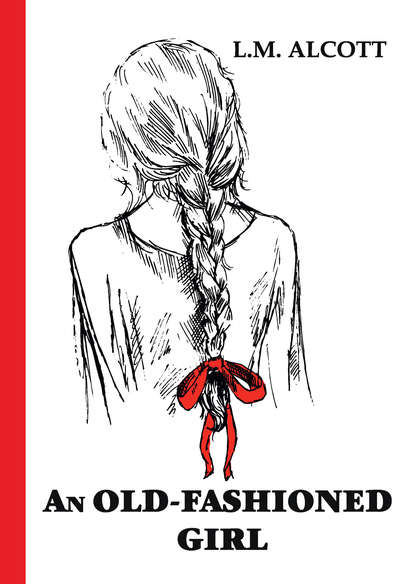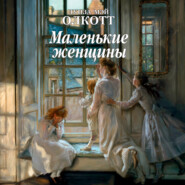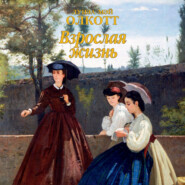По всем вопросам обращайтесь на: info@litportal.ru
(©) 2003-2024.
✖
An Old-Fashioned Girl
Настройки чтения
Размер шрифта
Высота строк
Поля
As soon as he had done it, he remembered that Fanny considered them vulgar, and felt that he had disgraced his family. So he stuck his head out of the window, and kept it there so long, that Polly asked if anything was the matter. “Pooh! who cares for a countrified little thing like her,” said Tom manfully to himself; and then the spirit of mischief entered in and took possession of him.
“He’s pretty drunk; but I guess he can hold his horses,” replied this evil-minded boy, with an air of calm resignation.
“Is the man tipsy? Oh, dear! Let’s get out! Are the horses bad? It’s very steep here; do you think it’s safe?” cried poor Polly, making a cocked hat of her little beaver, by thrusting it out of the half-open window on her side.
“There’s plenty of folks to pick us up if anything happens; but perhaps it would be safer if I got out and sat with the man;” and Tom quite beamed with the brilliancy of this sudden mode of relief.
“Oh, do, if you ain’t afraid! Mother would be so anxious if anything should happen to me, so far away!” cried Polly, much distressed.
“Don’t you be worried. I’ll manage the old chap, and the horses too;” and opening the door, Tom vanished aloft, leaving poor victimized Polly to quake inside, while he placidly revelled in freedom and peanuts outside, with the staid old driver.
Fanny came flying down to meet her “darling Polly,” as Tom presented her, with the graceful remark, “I’ve got her!” and the air of a dauntless hunter, producing the trophies of his skill. Polly was instantly whisked upstairs; and having danced a double-shuffle on the doormat, Tom retired to the dining room, to restore exhausted nature with half a dozen cookies.
“Ain’t you tired to death? Don’t you want to lie down?” said Fanny, sitting on the side of the bed in Polly’s room, and chattering hard, while she examined everything her friend had on.
“Not a bit. I had a nice time coming, and no trouble, except the tipsy coachman; but Tom got out and kept him in order, so I wasn’t much frightened,” answered innocent Polly, taking off her rough-and-ready coat, and the plain hat without a bit of a feather.
“Fiddlestick! He wasn’t tipsy; and Tom only did it to get out of the way. He can’t bear girls,” said Fanny, with a superior air.
“Can’t he? Why, I thought he was very pleasant and kind!” and Polly opened her eyes with a surprised expression.
“He’s an awful boy, my dear; and if you have anything to do with him, he’ll torment you to death. Boys are all horrid; but he’s the horridest one I ever saw.”
Fanny went to a fashionable school, where the young ladies were so busy with their French, German, and Italian, that there was no time for good English. Feeling her confidence much shaken in the youth, Polly privately resolved to let him alone, and changed the conversation, by saying, as she looked admiringly about the large, handsome room, “How splendid it is! I never slept in a bed with curtains before, or had such a fine toilet-table as this.”
“I’m glad you like it; but don’t, for mercy sake, say such things before the other girls!” replied Fanny, wishing Polly would wear earrings, as everyone else did.
“Why not?” asked the country mouse of the city mouse, wondering what harm there was in liking other people’s pretty things, and saying so.
“Oh, they laugh at everything the least bit odd, and that isn’t pleasant.” Fanny didn’t say “countrified,” but she meant it, and Polly felt uncomfortable. So she shook out her little black-silk apron with a thoughtful face, and resolved not to allude to her own home, if she could help it.
“I’m so poorly, mamma says I needn’t go to school regularly, while you are here – only two or three times a week, just to keep up my music and French. You can go too, if you like; papa said so. Do, it’s such fun!” cried Fanny, quite surprising her friend by this unexpected fondness for school.
“I should be afraid, if all the girls dress as finely as you do, and know as much,” said Polly, beginning to feel shy at the thought.
“La, child! you needn’t mind that. I’ll take care of you, and fix you up, so you won’t look odd.”
“Am I odd?” asked Polly, struck by the word, and hoping it didn’t mean anything very bad.
“You are a dear, and ever so much prettier than you were last summer, only you’ve been brought up differently from us; so your ways ain’t like ours, you see,” began Fanny, finding it rather hard to explain.
“How different?” asked Polly again, for she liked to understand things.
“Well, you dress like a little girl, for one thing.”
“I am a little girl; so why shouldn’t I?” and Polly looked at her simple blue merino frock, stout boots, and short hair, with a puzzled air.
“You are fourteen; and we consider ourselves young ladies at that age,” continued Fanny, surveying, with complacency, the pile of hair on the top of her head, with a fringe of fuzz round her forehead, and a wavy lock streaming down her back; likewise, her scarlet-and-black suit, with its big sash, little pannier, bright buttons, points, rosettes – and, heaven knows what. There was a locket on her neck, earrings tinkling in her ears, watch and chain at her belt, and several rings on a pair of hands that would have been improved by soap and water.
Polly’s eye went from one little figure to the other, and she thought that Fanny looked the oddest of the two; for Polly lived in a quiet country town, and knew very little of city fashions. She was rather impressed by the elegance about her, never having seen Fanny’s home before, as they got acquainted while Fanny paid a visit to a friend who lived near Polly. But she didn’t let the contrast between herself and Fan trouble her; for in a minute she laughed and said, contentedly, “My mother likes me to dress simply, and I don’t mind. I shouldn’t know what to do rigged up as you are. Don’t you ever forget to lift your sash and fix those puffy things when you sit down?”
Before Fanny could answer, a scream from below made both listen. “It’s only Maud; she fusses all day long,” began Fanny; and the words were hardly out of her mouth, when the door was thrown open, and a little girl, of six or seven, came roaring in. She stopped at sight of Polly, stared a minute, then took up her roar just where she left it, and cast herself into Fanny’s lap, exclaiming wrathfully, “Tom’s laughing at me! Make him stop!”
“What did you do to set him going? Don’t scream so, you’ll frighten Polly!” and Fan gave the cherub a shake, which produced an explanation.
“I only said we had cold cweam at the party, last night, and he laughed!”
“Ice cream, child!” and Fanny followed Tom’s reprehensible example.
“I don’t care! It was cold; and I warmed mine at the wegister, and then it was nice; only, Willy Bliss spilt it on my new Gabwielle!” and Maud wailed again over her accumulated woes.
“Do go to Katy! You’re as cross as a little bear today!” said Fanny, pushing her away.
“Katy don’t amoose me; and I must be amoosed, ’cause I’m fwactious; mamma said I was!” sobbed Maud, evidently laboring under the delusion that fractiousness was some interesting malady.
“Come down and have dinner; that will amuse you;” and Fanny got up, pluming herself as a bird does before its flight.
Polly hoped the “dreadful boy” would not be present; but he was, and stared at her all dinnertime, in a most trying manner. Mr. Shaw, a busy-looking gentleman, said, “How do you do, my dear? Hope you’ll enjoy yourself;” and then appeared to forget her entirely. Mrs. Shaw, a pale, nervous woman, greeted her little guest kindly, and took care that she wanted for nothing. Madam Shaw, a quiet old lady, with an imposing cap, exclaimed on seeing Polly, “Bless my heart! the image of her mother – a sweet woman – how is she, dear?” and kept peering at the newcomer over her glasses, till, between Madam and Tom, poor Polly lost her appetite.
Fanny chatted like a magpie, and Maud fidgeted, till Tom proposed to put her under the big dish-cover, which produced such an explosion, that the young lady was borne screaming away, by the much-enduring Katy. It was altogether an uncomfortable dinner, and Polly was very glad when it was over. They all went about their own affairs, and after doing the honors of the house, Fan was called to the dressmaker, leaving Polly to amuse herself in the great drawing room.
Polly was glad to be alone for a few minutes; and, having examined all the pretty things about her, began to walk up and down over the soft, flowery carpet, humming to herself, as the daylight faded, and only the ruddy glow of the fire filled the room. Presently Madam came slowly in, and sat down in her armchair, saying, “That’s a fine old tune; sing it to me, my dear. I haven’t heard it this many a day.”
Polly didn’t like to sing before strangers, for she had had no teaching but such as her busy mother could give her; but she had been taught the utmost respect for old people, and having no reason for refusing, she directly went to the piano, and did as she was bid.
“That’s the sort of music it’s a pleasure to hear. Sing some more, dear,” said Madam, in her gentle way, when she had done.
Pleased with this praise, Polly sang away in a fresh little voice, that went straight to the listener’s heart and nestled there. The sweet old tunes that one is never tired of were all Polly’s store; and her favorites were Scotch airs, such as, “Yellow-Haired Laddie,” “Jock o’ Hazeldean,” “Down amang the Heather,” and “Birks of Aberfeldie.” The more she sung, the better she did it; and when she wound up with “A Health to King Charlie,” the room quite rung with the stirring music made by the big piano and the little maid.
“By George, that’s a jolly tune! Sing it again, please,” cried Tom’s voice; and there was Tom’s red head bobbing up over the high back of the chair where he had hidden himself.
It gave Polly quite a turn, for she thought no one was hearing her but the old lady dozing by the fire. “I can’t sing any more; I’m tired,” she said, and walked away to Madam in the other room. The red head vanished like a meteor, for Polly’s tone had been decidedly cool.
The old lady put out her hand, and drawing Polly to her knee, looked into her face with such kind eyes, that Polly forgot the impressive cap, and smiled at her confidingly; for she saw that her simple music had pleased her listener, and she felt glad to know it.
“You mustn’t mind my staring, dear,” said Madam, softly pinching her rosy cheek. “I haven’t seen a little girl for so long, it does my old eyes good to look at you.”
Polly thought that a very odd speech, and couldn’t help saying, “Aren’t Fan and Maud little girls, too?”
“Oh, dear, no! Not what I call little girls. Fan has been a young lady this two years, and Maud is a spoiled baby. Your mother’s a very sensible woman, my child.”
“What a very queer old lady!” thought Polly; but she said “Yes’m” respectfully, and looked at the fire.
“You don’t understand what I mean, do you?” asked Madam, still holding her by the chin.
“No’m; not quite.”
“Well, dear, I’ll tell you. In my day, children of fourteen and fifteen didn’t dress in the height of the fashion; go to parties, as nearly like those of grown people as it’s possible to make them; lead idle, giddy, unhealthy lives, and get blasé at twenty. We were little folks till eighteen or so; worked and studied, dressed and played, like children; honored our parents; and our days were much longer in the land than now, it seems to me.”

















